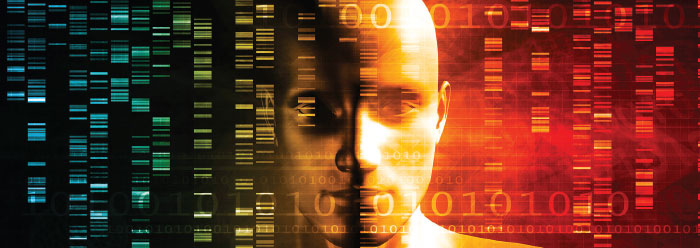The genome, the complete set of chromosomes in a cell, is like a computer hard drive that encodes the information stored in its DNA. Protein-coding genes are segments of DNA carrying instructions for making proteins. These segments are copied (transcribed) into RNA in a temporary fashion, just like copies of software programs are put into temporary memory on a computer. These temporary RNA instructions are then used as templates to make proteins.
As genomics technology advanced and studies became more comprehensive, scientists realized that protein-coding genes are only a portion of the genes transcribed into RNA. In fact, researchers have discovered that nearly the entire genome is transcribed.1,2
This idea of pervasive transcription led some scientists to call the genome an “RNA machine.”3 One significantly large component of this transcriptional landscape is produced from long non-coding RNAs (lncRNA), a diverse class of genes that do not code for proteins. These lncRNA genes, which outnumber protein-coding genes by at least two to one, perform a wide variety of functions in the cell.4,5
Because evolutionists didn’t understand lncRNA gene function, they originally labeled much of the RNA produced from these genes as nothing but transcriptional noise and prematurely assigned their sequences the now-defunct label “junk DNA.” A variety of these genes have since been investigated and found to have important functions,4,5 although it has been difficult to assign specific function to many of the human lncRNAs. Even many protein-coding genes in humans still have unknown function because of the ethical limitations of doing laboratory research on human subjects. And human cells grown in the lab, which are commonly studied for RNA transcription from both protein and non-coding RNA genes, are not necessarily indicative of what goes on inside a living human being.
Despite the limitations on gene function research in humans, a new study was published in which a large team of researchers in laboratories around the world integrated numerous large-scale data sets to ascertain function for lncRNAs in the human genome.6 The project’s goal was to find multiple lines of evidence for function that overlapped with lncRNA genes in the genome. In doing so, researchers identified over 19,000 lncRNA genes with multiple indicators of function. Interestingly, many of these genes had functional characteristics that were also directly associated with protein-coding genes, in which they likely play some regulatory and interactive role.
In the evolutionary paradigm, the incredible complexity of the genome is believed to have somehow evolved by random processes, and much of it is therefore thought to be nothing but useless evolutionary junk. The leading proponents of evolution are steeped in this type of speculation, called theoretical evolution, and have tried to play down recent discoveries of pervasive function across the genome. However, the biomedical genomics community is pragmatically focused on curing disease and is not nearly as limited by these naturalistic false presuppositions. Thanks to their efforts, the incredible functionality of the entire genome and all of its seemingly infinite complex workings are glorifying the omnipotent Creator who made it all.
References
- Carninci, P. et al. 2005. The transcriptional landscape of the mammalian genome. Science. 309 (5740): 1559-1563.
- Djebali, S. et al. 2012. Landscape of transcription in human cells. Nature. 489 (7414): 101-108.
- Amaral, P. P. et al. 2008. The Eukaryotic Genome as an RNA Machine. Science. 319 (5871): 1787-1789.
- St. Laurent, G., C. Wahlestedt, and P. Kapranov. 2015. The Landscape of Long Noncoding RNA Classification. Trends in Genetics. 31 (5): 239-251.
- Morris, K. V. and J. S. Mattick. 2014. The rise of regulatory RNA. Nature Reviews Genetics. 15 (6): 423-437.
- Hon, C.-C. et al. 2017. An atlas of human long non-coding RNAs with accurate 5′ ends. Nature. 543 (7644): 199-204.
* Dr. Tomkins is Director of Life Sciences at the Institute for Creation Research and earned his Ph.D. in genetics from Clemson University, where he worked as a research technician in a plant breeding/genetics program. After receiving his Ph.D., he worked at a genomics institute and became a faculty member in the Department of Genetics and Biochemistry at Clemson.














